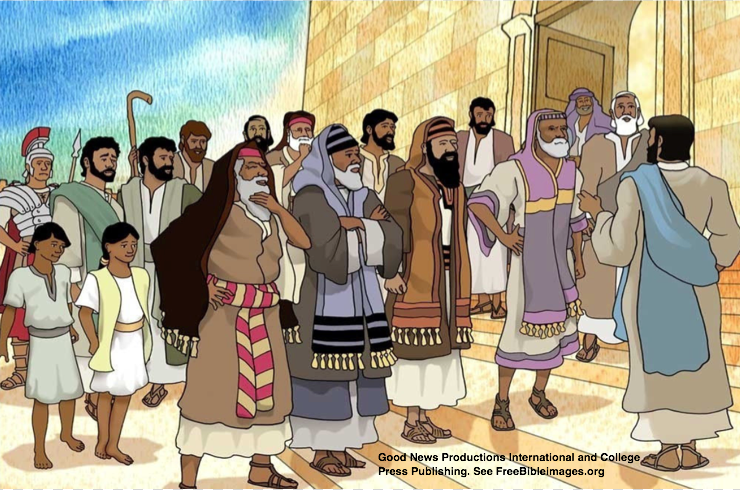“But when the Helper comes, whom I shall send to you from the Father, the Spirit of truth who proceeds from the Father, He will testify of Me.” John 15:26
From Jesus’ instruction to His eleven believing disciples, we are learning how we can be effective witnesses to a hostile world. So far we have discovered we can be effective witnesses to a hostile world when we…
– Realize that we will face the same conflict with the world that Jesus did (John 15:18-19).
– Recall what Jesus has already taught us (John 15:20).
– Recognize that the world is not opposed to us personally, but to our relationship with Christ (John 15:21-25).
The fourth way to be an effective witness to a hostile world is to REMAIN IN VITAL CONTACT WITH CHRIST THROUGH THE HOLY SPIRIT (John 15:26-27). Jesus knew that when His disciples would be faced with the hatred of the world, they may be tempted to escape from it or remain silent about the gospel. After all, the world can be very brutal toward Christians. The world does not care about your personal well-being. Even though the world would be antagonistic to the disciples’ ministry and message, they were to bear witness of Jesus.
Christ reminds them (and us) that they would not be left alone to fulfill their responsibilities when He goes to the Father in heaven. There would be two witnesses from God to the world. Who is the first witness that Jesus mentions in verse 26? “But when the Helper comes, whom I shall send to you from the Father, the Spirit of truth who proceeds from the Father, He will testify of Me.” (John 15:26). The first witness is the Holy Spirit. Jesus teaches us several things about Him. He is “the Helper” (ho paraklētos) or one “called alongside to help.” 1 He is the One who will assist, empower, and encourage the disciples to be a witness for Christ in a hostile world. If we try to overcome the hostility of the world with our own strength, it will be one huge struggle laden with failure. Satan will oppose us through the world’s system and we are not wise enough or strong enough to overcome him on our own. We must abide in Jesus and yield to the Holy Spirit’s control in our lives to experience victory over the hostility of the world.
To be effective witnesses, we must remain in vital contact with Christ through His Holy Spirit and the Word. That’s why Jesus refers to the Holy Spirit as “the Spirit of truth.” He tells the truth about Christ through the truth of God’s Word (cf. John 14:6; 17:17). Jesus says, “He will testify of Me.” The primary ministry of the Holy Spirit is to testify about Jesus through God’s Word. The Spirit’s ministry is not to testify about Himself or you or me. His purpose is to magnify Jesus Christ! If a church or ministry is not magnifying the Person and work of Jesus Christ on the cross, it is doubtful that church or ministry is being led by the Holy Spirit. If the Spirit magnifies Jesus Christ, then His disciples should do the same.
Notice that verse 26 refers to all three Persons of the Godhead. “The Helper” or “Spirit of truth” will be sent by Jesus “from the Father,” and the Spirit will also “testify of” Jesus. The Holy Spirit will empower the second witness.
Who is the second witness? “And you also will bear witness, because you have been with Me from the beginning.” (John 15:27). The word “you” refers to the disciples in this context, but it also refers to all believers since that time, including you and me today. The word “also” indicates that the witness of the disciples is important. It shows that the disciples and the Spirit together would “bear witness” to Christ. The word translated “bear witness” (μαρτυρεῖτε) is a courtroom term that refers to speaking the truth. What would happen if you took the witness stand in a court of law and never said anything? The judge would hold you in contempt of the court. So this term demands that we speak the truth. Christ is saying that we are to tell the truth about Jesus, so people can be saved. What is the truth about Jesus that saves people from an eternity in hell?
That He died for our sins and rose from the dead (I Corinthians 15:1-6). Why did Jesus have to die? Because all people have sinned against God (Romans 3:23) with their thoughts, words, and actions. Our sin separates (“death”) us from God (Romans 6:23) because God is holy and righteous and cannot be around our sin. Therefore, God sent His only Son, Jesus Christ, to pay the penalty for all our sin when He died on the cross and rose from the dead, proving that He is God (Romans 1:3-4; I Corinthians 15:1-6). Jesus now invites everyone to believe or trust in Him alone for His gift of everlasting life: “For God so loved the world that He gave His only begotten Son, that whoever believes in Him should not perish but have everlasting life.” (John 3:16).
Jesus is not inviting us to be baptized or go to church because He never said, “whoever is baptized or goes to church should not perish but have everlasting life.” Nor is Christ inviting us to pray every day or to live a good life because He never said, “whoever prays every day or lives a good life should not perish but have everlasting life.” Jesus is simply inviting us to believe or trust in Him alone because He said, “Whoever believes in Him should not perish but have everlasting life.”
No amount of our good works can save us from our sins because they are all like “dirty rags” in the sight of a holy God (Isaiah 64:6). We must trust in Christ alone as our only hope of heaven and He will give us eternal life and a future home in heaven.
As disciples, we need God’s Spirit for empowerment and the Spirit needs us as a means of expression. Why were the disciples chosen to be witnesses? Because they “have been with” Jesus “from the beginning” of His ministry when He was baptized by John the Baptist (John 15:27; cf. 1:29ff). These men would be credible witnesses to the Person of Christ because they had been loyal to Him. They could have abandoned the Lord when persecution intensified, and they did for a short time, but then they came back to Him and He used them to change the known world.
Two things in verses 26-27 are foundational to be an effective witness for Christ. 2 First, we must clearly witness. Those of us who have been richly blessed by the grace of God for salvation are compelled to clearly share this grace with others. We must focus on the finished work of Christ on the cross as the basis of salvation (John 19:30), not our good works (Romans 4:5; Ephesians 2:8-9). Since salvation is a free gift (John 4:10-14; Romans 3:24; 6:23b; Ephesians 2:8-9; Revelation 22:17), we must emphasize faith alone in Christ alone as the means of salvation (John 3:15-16, 36; 6:40, 47; 11:25-26; 20:31; Romans 3:21-4:25; Galatians 2:16; I Timothy 1:16; I John 5:1, 13; et al.), not a “faith plus” formula. The more we understand and experience the grace of God, the more passionate we will be to share the clear gospel of grace with the lost.
Second, we never witness to others alone. The Holy Spirit is always with us and in us to give us a power that is not our own. When we are afraid to speak up for Christ, He can give us the boldness we need with those who may intimidate us (cf. Acts 4:29-31). When we don’t know what to say, He can give us the words that our listeners need to hear (cf. Matthew 10:19-20). It is His responsibility to persuade people through the Word of God to believe or trust in Christ alone as their only way to heaven (John 16:7-11). But it is our responsibility to yield to His control (Ephesians 5:18).
Prayer: Lord Jesus, thank You so much for sending God the Holy Spirit from God the Father to be our Helper in witnessing to a hostile world. I never ever have to be alone when I tell others about Jesus because the Holy Spirit permanently indwells me. And when I feel afraid of what others will think, say, or do if I share Christ with them, the Spirit of truth gives me the boldness and the words to share with them unashamedly. So many times I lack insight when sharing the gospel with others, but You intervene and bring to my remembrance the truth that the listener needs to hear. Thank You Holy Spirit for the power You give to me when I yield to Your control. In the mighty name of Jesus Christ I pray. Amen.
ENDNOTES:
1. J. Carl Laney, Moody Gospel John Commentary (Chicago: Moody Press, 1992), pg. 282.
2. Ibid., pg. 283.








